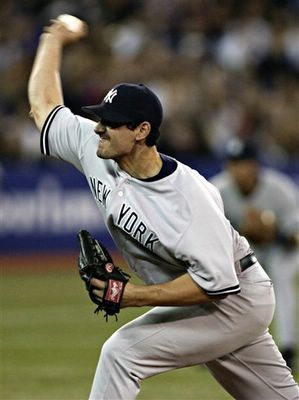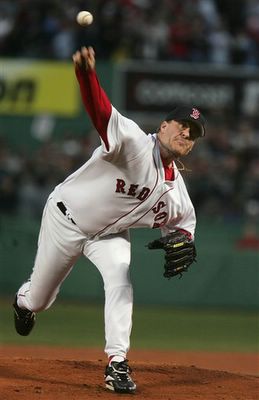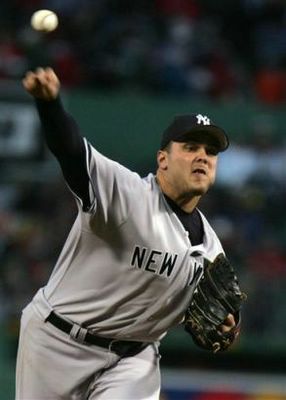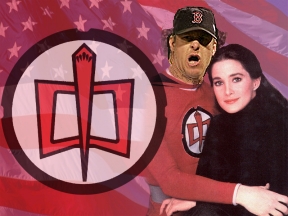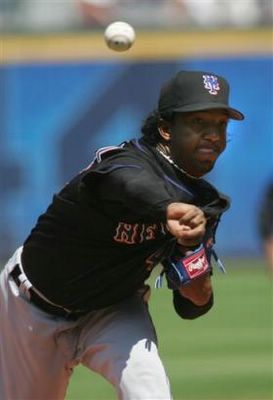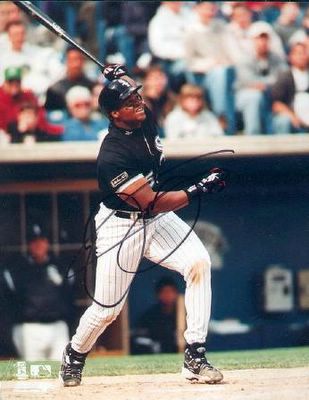As a baseball fan, and by some accounts, a baseball writer, I have an obligation not to just sit by and allow the biggest stories of the year to simply elude me, for any reason. I cannot allow the fact that a story might not pertain to my favorite team to prevent me from writing. I cannot allow, worse yet, the fact that a story may reflect badly on a players from my favorite team to keep me from writing. I cannot even allow, and you may find this hard to believe but stick with me here, the fact that I have absolutely nothing unique or interesting to say on the matter to prevent me from commenting on a story.
And why? Is it because you, my reader(s?), have come to expect hard-hitting, tough-nosed reporting from Boy of Summer? Is it because you expect insightful commentary and a singular perspective from Boy of Summer? Is it because I'm bigger than you and I might beat you up?
No. It's because if I don't write on some kind of regular basis, I only get about eleven lousy hits on this website in a day. And half of those are from me, checking to see if anyone else has been reading.
And so, despite the fact that a nasty case of bronchitis still has me a little closer to Death's Door than I am comfortable with, I will take some time to do what I (apparently) do best: Wise crack about the news.
Barry Bonds Spring Training Press Conference
Q. Can you explain over the last four or five years your amazing production, your tremendous growth in muscle strength getting stronger as you get older? Can you finally put to rest --
BARRY BONDS: Can I? Hard work that's about it. Now it's to rest.
Q. That's it?
BARRY BONDS: That's it.
TMN: Wow! And I thought it was all those milk shakes, or his spiffy, new Nike cleats.
What Barry should have said was that he couldn't answer this question becasue it pertains to the BALCO case, which would have allowed him to answer the question honestly (for once) without actually answering it. He could have simultaneously been both more honest
and more elusive than Jason Giambi was in his press conference last week! Now that's one for the record books!
Q. What was the bigger off-season distraction, dealing with the steroid issue or the knee problem?
BARRY BONDS: [...] You know, I know that I'm older now. I put my body through a lot in 147 games last year. I played more games than anyone on my team, and the oldest and I'm still trying to recover from that.
But the most part is just my knees. I have to be able to play at a level that I want to play at, and, you know, right now, I'm having a little bit more difficulties with this right one than I did with the left one.
TMN: Hey, Barry, you should try steroids. I've heard that they can help with healing from injuries, especially as you get older...
Q. Jose Canseco singled you out, I want to know what your reaction is to that, and also, what he said about Mark McGwire, do you believe what he said?
BARRY BONDS: [...] But I don't know Jose. I was better than Jose now and I've been better than Jose his whole career. So I don't have anything to talk about Jose. If he wants to go make money, go make money. You had the Bash Boys, you had one of the best lineups in baseball that's second to some of the Yankees lineups or you can go on. For somebody that brags about what he did, I don't see any of your records.
TMN: Technically, Barry, you weren't better than him "then" depending on when "then" is. You and Canseco are nearly the same age, born in the same month in 1964, and you came up around the same time. Canseco was apparently better than you in High School, since he got drafted then and you didn't. He was better than you in 1985 as he plowed his way through two minor league levels and the majors, hitting .328 with 41 homers and 140 RBI, as you spent the season hitting .299 in the Carolina League. He was better than you in 1986, winning AL Rookie of the Year Honors with 33 homers and 117 RBI, as you played 44 games in the Pacific Coast League and hit only .223 for the Pirates in 113 National League games.
You and Canseco were roughly comparable in 1987, him with more power, you with more patience and speed.
But Canseco easily outpaced you in 1988, hitting .307 with 42 homers, 40 steals, 120 runs and 124 RBI to win AL MVP honors easily, as you hit .283 with decent power, but only 17 steals in 28 attempts. He was better than you in 1989, despite an injury that linited him to 65 major league games, and 1990 and 1991 were again roughly comparable years for the two of you, each with your own strengths and weaknesses (his power, your speed and batting eye). It was't until 1992, when you started winning MVP awards, and Jose started getting injured and/or playing for Texas, that it could be said that you were clearly "better than him." Just so we're clear on that.
And besides, where does it say that talent and credibility go hand-in-hand? I didn't realize that lawyers select witnesses based upon their career accomplishments, but then, I'm not a lawyer.
Q. Jose maintains that he did take steroids -- inaudible -- Mike Greenwell feels he should get the MVP because Canseco admitted that he used steroids. What's your opinion on that? And people who achieve awards, should there be an asterisk or maybe it taken back?
BARRY BONDS: You know, I feel that baseball -- I commend Bud Selig and the Players Union and all of the players for trying to put together a testing program that supposed to satisfy everyone. I cannot say enough for what Bud has come out and stated. The Union and the players -- I mean, you can't -- you guys are like rerun stories. This is just -- this is old stuff. I mean, it's like watching Sanford and Son, you know, you just, rerun after rerun after rerun.
You guys, it's like, what, I mean, you can't -- it's almost comical, basically. I mean, we've got alcohol that's the No. 1 killer in America and we legalize that to buy in the store. You've got, you know, you've got tobacco number two, three killer in America, we legalize that. There's other issues. You guys are going to be the same people next week as some tragedy happened, how we need to save our children and everything else and next week, you're the same people sitting there coming, how we should be doing this and how we're evil people, or, you know, you guys, it's one thing after another. You know, pick one side or the other. Are y'all going to be good people or are you all going to be who you are and make the game or sports what it is? It's become "Hard Copy" all day long. Are you guys jealous? Upset? Disappointed? What?
TMN: Does anyone know if any research has been done to correlate steroid use with an inability to form complete sentences?
And someone should point out to Barry that the next column Tom Boswell or Murray Chass writes about alcoholism or tobacco addiction will be their first. They cover baseball, and as long as steroids is germane to baseball, they'll keep covering it. Does Barry think that the press should have stopped writing stories about gambling in baseball once Ring Lardner had published his first column on the 1919 World Series, just because he'd done it once?
Q. As you approach Babe Ruth on the home run charts, is it troubling to you that people are scrutinizing your achievements, particularly home runs?
BARRY BONDS: No, you guys don't bother me. You're professional at what you do. That doesn't bother me. That's part of the game. That's part of sports, it always has been.
The problem with me, my dad told me before he past away, he said, "The biggest problem with you, Barry is that every great athlete that has gone on for great records, everyone knows their story. People have made hundreds of millions of dollars off their stories with them and protected them. Nobody knows you and they are pissed off."
[...]
I'm an adult and I take responsibilities for what I do, but I'm not going to allow you guys to ruin my joy.
TMN: No, Barry. The problem with you is
not that you don't let the public know you. The problem is that everything we do know about you seems to indicate that you're a jerk. You have a right to be a recluse. You don't have a right to be a butthead.
And while we're on the subject of "joy", you should realize that this is not simply about
your joy, it's about the joy of the 40,000+ fans who come to see you everywhere you go, the joy of the millions who watch you on TV or listen to your games on the radio. It's about the joy of the
fans, you self-absorbed, overpaid primadonna. You're an entertainer. You might find a little more joy in entertaining people if you would let them in a little, but if not, don't blame them for wanting to know what makes you tick (besides muscle spasms).
Q. Right or wrong, true or false, a lot of the accusations, particularly involving Canseco's book, people are saying it's damaged the game, do you agree with that? And if so, does it bother you that it's damaged the game that you play for a living?
BARRY BONDS: I don't -- I think a lot of things have damaged sports with a lot of just the whole, everything. But there's a lot worse things going on in our world, a lot more worse. You should focus on fixing those first.
TMN: Well,
someone should focus on fixing those things, but I'm not sure that the baseball beat writers are necessarily the best option for that.
Q. Jason Giambi felt the need to make an apology. Is there anything that you need to apologize for?
BARRY BONDS: What did I do?
Q. Well, he talked about the grand jury testimony.
BARRY BONDS: Yeah, but what did I do? I'm just sorry that we're even going through all this rerun stuff. I'm sorry that, you know, this fictional stuff and maybe some facts, who knows, but I'm sorry that, you know -- we're all sorry about this.
None of us want to go through this. None of us want to deal with this stuff. We want to go out and do our job. But what's your purpose and what you're doing it for, rewriting it, writing it over and over and over and over again, what's your reasoning? What are you going to apologize for when you're wrong?
TMN: This is about as much as anyone was able to get out of Barry about the BALCO trial, which is not much. Bonds is still missing the point that this remains a HUGE story until it's settled, and that it's far from settled. The media don't continue to pester him about it because they're jealous or upset, they harp on the issue because it's still an issue.
We have leaked grand jury testimony indicating that Bonds did use steroids, but he continually keeps his head in the sand and refuses to acknowledge having anything to do with steroids. He purportedly can't say anything about the issue because of "legal constraints" which means essentially that he could be brought up on charges for discussing the trial while it's still going on, but witnesses are not legally under those constraints, only jurors. Am I worng here? Or is Barry just trying to save face?
Q. Can you talk about batting with Moises Alou behind you?
BARRY BONDS: I hope it's going to be fun, man, because from what I hear, they say they are going to pitch to me more, so it's going to be a lot quicker for me. (Laughing.)
But who knows. But, you know, it's going to be fun. But we're all old on our team, so it's going to be interesting. I'm going to talk with Michael Tucker a lot because I think Michael Tucker is going to play like -- we're going to go three days and then just Tucker is going to play 162 days: Left, center, right; left, center, right; left, center, right, while the rest of us take some time off.
TMN: Man, for the sake of Giants fans everywhere, I hope not. Tucker may be the youngest of the Giants' outfielders, but he's also the worst hitter, if not appreciably worse than Marquis Grissom. And at 33, Tucker isn't likely to get any better either. If Felipe Alou plans to give any significant amount of Bonds' and Moises Alou's playing time to Tucker, they might as well throw in the towel now.
Q. You mentioned a setback and what we've been told from the beginning since July 31 when you had this operation that you would be ready to play in an exhibition game around the 15th of March and there --
BARRY BONDS: Where did you hear that from?
Q. That was what was in the release, I believe that was--
BARRY BONDS: Why do you guys never give up your source? Name, name, name, please.
Q. [Giants trainer] Stan Conte.
BARRY BONDS: Stan Conte did not say that, that's a lie. I know for a fact Stan could not have said it. See, you guys...
Q. The official release --
BARRY BONDS: See, you lied, you lied. Next question. (Laughter.)
Q. Will you be ready to play by April 5th?
BARRY BONDS: April 5? Opening Day. I don't know. But you did lie.
TMN: There you go, Barry, way to endear yourself to the media. Call them liars for quoting your teams official press releases. I understand that criticizing them for the headlines on their newspaper columns is also a good way to make friends. Why don't you try prank phone calls while you're at it?
Q. Everybody in this room agrees with what you said, this is a circus --
BARRY BONDS: I like you. What's your name, man?
Q. What would be your solution to end the circus?
BARRY BONDS: I think that allow Major League Baseball, Bud Selig and the Union and its players, allow the drug testing program to work. Allow it to work. Let's go forward. I truly believe that we need to go forward. Okay, you cannot rehash the past. If that's the case, we're going to go way back into 19th, 18th centuries in rehashing the past and we'll crush a lot of things in a lot of sports if that's what you guys want. If you just want a lot of things out of the sports world, then we can go back into the 1800s and basically asterisk a lot of sports if that's what you choose and that's what you want to do. If that's going to make you happy and everything, then go right ahead, figure it out, who you want, it's going to go all the way down the line.
But, things that happen in sports, in all sorts of sports, it's time to move on. Every time there has been incident, it has been corrected and now that it's being corrected, I think we need to go forward, move forward, let it go. Y'all stop watching Red Foxx in rerun shows and let's go ahead and let the program work and allow us to do our job.
TMN: Barry's actually right about this. Obnoxious, but right.
The notion of an asterisk on anyone's records, for any reason, is just silly. People did what they did, and their accomplishments are matters of meticulously kept public record. It's up to the thinking fan to figure out what they mean. We're not diminishing Roger Maris for needing eight more games than Babe Ruth to hit 61 homers. We're not ignoring records from the 1960's because most players were high on amphetamines. We don't pretend that Cy Young and Christy Matthewson and a host of 19th century record holders didn't exist just because they pitched during the dead ball era, and we can't do it to Barry Bonds.
But like these others, we need to understand the context in which those records were set, and we can't let the issue go until we're clear on that. So get used to it, Barry.
Q. What's going to be your approach to repair it from here on out? You are you expect other people to come clean and move forward?
BARRY BONDS: We just need to go out there and do our jobs, just as you professionals do your job. All you guys lied. All of y'all and the story or whatever have lied. Should you have asterisk behind your name? All of you lied. All of you have said something wrong. All of you have dirt. All of you. When your closet's clean, then come clean somebody else's. But clean yours first, okay.
But I think right now baseball just needs to go forward and you guys need to turn the page and let's move forward. Let us play the game, and we will fix it. I think we all want to, I think we all have a desire to. I think we all are hurting, including myself.
TMN: Barry, you're not getting it. They are doing their jobs. Their jobs are to describe you and other people who do your job, and to find out, if possible, what allows you to do your job well and/or prevents the same. Their job isn't just to record the data. We have box scores for that. Their job is to get the inside information. We'll move on when the issue is put to rest.
If they've truly made erroneous reports, then that will eventually become apparent. If the San Francisco Chronicle Dan Rathered this grand jury testimony story, then they'll be called to task for it, in time. But as far as we know, none of these reporters has just made this story up, accusing you out of thin air. There's a legal document out there, albeit one we shouldn't yet know about, that says you used steroids. You've denied it in this forum, i.e. the Locker Room, but in another forum (the Courtroom) you've apparently admitted it, and the public has a right to know which of those two mutually exclusive assertions is actually true.
Q. If and when you break Hank's record, do you think fans across the country will celebrate (ph) it?
BARRY BONDS: I do. I really I do. Fans like sports. Fans love sports. Yes, I do.
TMN: I do too, or at least I hope so. Regardless of the auspices under which these records have been set, History is still History. Barry Bonds has accomplished incredible things, with or without performance enhancing substances to aid him, and if I had the opportunity to be present for #756, I surely would stand and cheer.
Q. Do you view the use of steroid as cheating?
BARRY BONDS: As cheating? I don't -- I don't know what cheating is. I don't know cheating, if steroid is going to help you in baseball. I just don't believe it. I don't believe steroids can help you, eye/hand coordination, technically hit a baseball, I just don't believe it and that's just my opinion.
TMN: Hand-eye coordination? Probably not, but then nobody ever said that was the reason for using them, did they? But muscle mass buildup? Ability to heal more quickly? Staving off the physical wear and tear of a long season? Absolutely. Hand-eye coordination is not the only thing teams look for in professional baseball players. If it were, they'd be sending their scouts to video arcades and internet gaming chatrooms. I personally have good enough hand-eye coordination and reflexes to beat Zuma, but I can barely hit a baseball 200 feet.
Q. You talked about protecting your family when your kids come home and they tell you stories of your reputation under attack, what do you say to them?
BARRY BONDS: None of your business because I wouldn't let you in my house.
TMN: Nice, Barry. An excellent way to punctuate the interview session. Too bad you couldn't have ended that sentence with a swear word. I hope your children learn their manners from your wife, because as an example of etiquette and courtesy, well, you make a great left-fielder.


